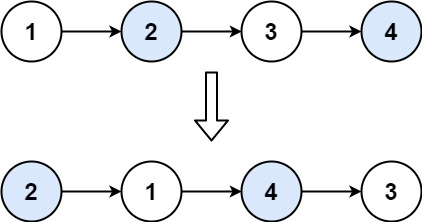LeetCode-in-All
24. Swap Nodes in Pairs
Medium
Given a linked list, swap every two adjacent nodes and return its head. You must solve the problem without modifying the values in the list’s nodes (i.e., only nodes themselves may be changed.)
Example 1:

Input: head = [1,2,3,4]
Output: [2,1,4,3]
Example 2:
Input: head = []
Output: []
Example 3:
Input: head = [1]
Output: [1]
Constraints:
- The number of nodes in the list is in the range
[0, 100]. 0 <= Node.val <= 100
To solve the “Swap Nodes in Pairs” problem, you can follow these steps:
Approach:
- Initialize a Dummy Node:
- Create a dummy node to simplify handling edge cases and to serve as the new head of the modified linked list.
- Initialize Pointers:
- Initialize three pointers:
prev,current, andnext.
- Initialize three pointers:
- Iterate through Pairs:
- Use a loop to iterate through the linked list in pairs.
- Inside the loop:
- Update
prev.nextto point to the second node in the pair (next). - Update
current.nextto point to the node after the pair (next.next). - Update
next.nextto point to the first node in the pair (current). - Move
prev,current, andnextpointers to their next positions for the next pair.
- Update
- Return Modified Head:
- Return the
dummy.nextas the new head of the modified linked list.
- Return the
Python Code:
class ListNode:
def __init__(self, val=0, next=None):
self.val = val
self.next = next
class Solution:
def swapPairs(self, head):
# Initialize a dummy node
dummy = ListNode(0)
dummy.next = head
prev = dummy
# Iterate through pairs
while head and head.next:
# Initialize pointers
current = head
next_node = head.next
# Swap pairs
prev.next = next_node
current.next = next_node.next
next_node.next = current
# Move pointers for the next pair
prev = current
head = current.next
# Return modified head
return dummy.next
# Example Usage:
solution = Solution()
# Example 1:
head1 = ListNode(1, ListNode(2, ListNode(3, ListNode(4))))
result1 = solution.swapPairs(head1) # Output: ListNode(2, ListNode(1, ListNode(4, ListNode(3))))
# Example 2:
head2 = None
result2 = solution.swapPairs(head2) # Output: None
# Example 3:
head3 = ListNode(1)
result3 = solution.swapPairs(head3) # Output: ListNode(1)
This code defines a Solution class with a method swapPairs that takes a linked list as input and swaps every two adjacent nodes. The example usage demonstrates how to create an instance of the Solution class and call the swapPairs method with different inputs.

